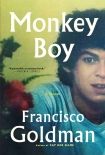Monkey Boy, Francisco Goldman [best story books to read .txt] 📗

- Author: Francisco Goldman
Book online «Monkey Boy, Francisco Goldman [best story books to read .txt] 📗». Author Francisco Goldman
Rebeca is going out for a soda and snack break, so María has to tend to customers again. I should have said goodbye to her when she left. Now it’s only polite that I wait until I can say goodbye to both. The first time I saw this arrowhead in Lexi’s hand, I’d immediately remembered reading about an arrow fired by a Wampanoag warrior from a distance of two hundred yards that went all the way through a Puritan militiaman and the woman he was out walking with, pinning both to the trunk of a tree, and I’d thought to myself, That arrowhead must have been just like this one. That’s what especially inflamed my covetousness, I think. I put it into my pocket and sit down to wait. The midafternoon sun, weakly breaking through the clouded-over sky, now seems to infuse the stucco façade across the street, making it glow tomatillo green. If María succeeds in helping me get in touch with Zoila, will I write something about her case? We’ll see. If she gives me permission, along with enough information so that I can dig into it a little bit more, sure I will. How could I refuse?
All my life, I’ve been answering some version of the inevitable question: But aren’t you Jewish? (Weren’t you just introduced to me as Frank Goldberg? Then what do you mean that you were baptized in that church?) I’m half-Jewish, I’ve always answered. Usually adding: My mother is Catholic. (I’m half-Jewish and half-Catholic, I’m sure I used to say as a boy.) Those questions always felt threatening to me; to some degree, they still do. When I answered like I did, did people think I was saying that I was or wasn’t Jewish? That’s what I’m thinking about, sitting here in this sleek hipster pub that I stopped into after saying goodbye to María and Rebeca at the laundromat and walking around the neighborhood a bit, fuming about Father Blackett, Lexi’s arrowhead in my pocket.
When I was a kid, I never would have dared to say out loud: I want to be just one thing, like a normal person is, though I thought it all the time. Having a mother from Guatemala is weird enough, but at least she’s Catholic. I’d rather be Catholic because that’s more normal. I did know there was some sort of rabbinical law that if the mother isn’t Jewish then her children aren’t either, but it wasn’t a law I ever saw enforced in any way, or that anyone else seemed to know or care about. As a child I did ask my mother to let me go to Sunday School at St. Joe’s. But Bert said, Yoli, they’ll slaughter him. He can’t defend himself against one Gary Sacco, what’s going to happen when every goddamned kid is Gary Sacco? Instead, I was put into after-school Hebrew classes. I don’t know how Bert didn’t foresee what a disaster that was going to be. When two weeks later I just stopped going, not a mote of dust was stirred by query or protest from any quarter.
I want to be nothing. Why can’t I just be nothing? What if I’d said that? But what can a fourteen-year-old really know about being nothing?
Nada us our nada as we nada our nadas. But there’s no Nada IPA on the menu, so I tentatively order the Spaceman IPA. The waitress, tall and trim in all black, reassures me that I’ve made a good choice. I order a grilled fontina and guanciale sandwich, too. She brings the beer, and I silently toast and drink to nada.
Up to fifth grade, Mamita always took us back to Guatemala City for the summers, and even though they were supposed to be our vacation months, we were always put in schools. For a few of those summers I was enrolled in the Colegio Ann Hunt. Ann Hunt was an expat from Alabama, and her husband, Scobie, owned travel agencies and tourist hotels. It was at the Colegio Ann Hunt that I encountered for the first time, in the school library, the phenomenon of strictly classifying writers by ethnicity and race. The shelves labeled “American” held books by writers from Alcott to Wolfe. The bottom shelves, inches above the floor, of two adjoining bookcases were labeled “Negro,” Baldwin to Wright, and “Jewish,” Bellow to Wouk, the lower parts of those book spines scuzzy with the dust of broom sweepings. Latino/Latina, or Hispanic, or however Ann Hunt might have labeled it, wasn’t on her map yet, and neither were Asian, Native American, etcetera. What would Ann Hunt’s library be like now, if she were still alive and her mania for disaggregating and classification had never slackened? Ever-expanding, infinitely bifurcating? Now I know that Ann Hunt was a pioneer of the American multicultural book business, however inadvertently. She should have gotten a medal.
“In a hypercapitalist society like this one, this commodification of ethnicity and race is both inevitable and good business, much better than just dispersing these writers like multi-colored sprinkles into our more established commercial batters, but you do have to be clear about what you’re selling. Somebody buying a novel in our coveted Guatemalan-American niche doesn’t want to be surprised to find a bunch of Jews and half-Jews in there.” I didn’t foresee, when I published my first short stories, how easy I could have made things for myself by publishing under my mother’s maiden name, Montejo,





Comments (0)